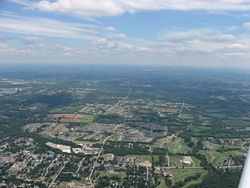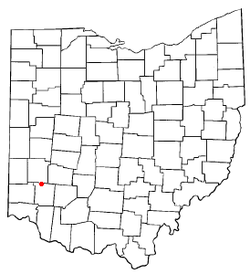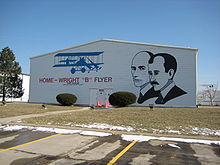Springboro, Ohio
Springboro, Ohio | |
|---|---|
| City of Springboro | |
 Lower Springboro from the air | |
| Motto: "Live. Work. Play. Learn. Grow." | |
 Location of Springboro, Ohio | |
 Location of Springboro in Warren County | |
| Coordinates: 39°33′35″N 84°15′18″W / 39.55972°N 84.25500°W | |
| Country | United States |
| State | Ohio |
| Counties | Warren, Montgomery |
| Area | |
| • Total | 9.21 sq mi (23.85 km2) |
| • Land | 9.21 sq mi (23.85 km2) |
| • Water | 0.00 sq mi (0.00 km2) |
| Elevation | 804 ft (245 m) |
| Population (2020) | |
| • Total | 19,062 |
| • Density | 2,069.93/sq mi (799.21/km2) |
| Time zone | UTC-5 (Eastern (EST)) |
| • Summer (DST) | UTC-4 (EDT) |
| ZIP code | 45066, 45342 |
| Area code(s) | 937, 326 |
| FIPS code | 39-74076[3] |
| GNIS feature ID | 2395938[2] |
| Website | http://www.cityofspringboro.com/ |
Springboro is a city in the U.S. state of Ohio. Regarded as a suburb of Cincinnati and Dayton,[4] it is located mostly in Warren County in Clearcreek and Franklin Townships; with a small portion in Miami Township in Montgomery County. The city is part of the Miami Valley. As of the 2020 census, the city had a population of 19,062.
Springboro is located at the geographic center of the Cincinnati-Dayton Metroplex, the 14th largest urban area in the United States.[5][6] Most of the city is located in Warren County, and is part of Metro Cincinnati. The far northern portion is in Montgomery County, the central county of Metro Dayton. Most of Springboro is served by the Springboro Community School District and its high school, Springboro High School.
Geography
[edit]According to the United States Census Bureau, the city has a total area of 9.36 square miles (24.24 km2), all land.[7]
Transportation
[edit]Springboro is accessible by three of the major expressways in the Cin-Day Metro Region:
- I-75: From the Cincinnati-Dayton Trans-Metropolitan Expressway
 I-75 via the
I-75 via the  SR 73 and Austin Blvd. exits
SR 73 and Austin Blvd. exits - I-71: From the 3-C Highway
 I-71 via the Kings Mills Rd.
I-71 via the Kings Mills Rd.  SR 741 and
SR 741 and  SR 73 exits.
SR 73 exits. - I-675: From the Greater Dayton-Bypass
 I-675 via Yankee Street at the
I-675 via Yankee Street at the  SR 725 exit.
SR 725 exit.
The main crossroads of the city center are ![]() SR 73 (Central Avenue) and
SR 73 (Central Avenue) and ![]() SR 741 (Springboro Pike/Main Street). Central Avenue runs east–west, and Springboro Pike/Main Street is the north–south thru-way, connecting the city with the urban cores of Cincinnati and Dayton. Main Street is also used as an alternate route to Interstate-75.
SR 741 (Springboro Pike/Main Street). Central Avenue runs east–west, and Springboro Pike/Main Street is the north–south thru-way, connecting the city with the urban cores of Cincinnati and Dayton. Main Street is also used as an alternate route to Interstate-75.
Springboro is served by the Greater Dayton RTA by a single bus stop on the extreme northern border of the city at Austin Landing.[8]
Dayton-Wright Brothers Airport is located on Springboro Pike, near the city's northern border along the Montgomery-Warren County line. The airport serves strictly private jets and small planes. The airport also serves as a small museum with a scale-replica of the original Wright-B Flyer. For commercial service, James M. Cox-Dayton International Airport and Cincinnati-Northern Kentucky International Airport are each about an hour north or south of the city, respectively.[9][10]
History
[edit]Settled as early as 1796, Springboro was founded in 1815 by Jonathan Wright, as "Springborough." Jonathan Wright's father Joel was a surveyor who plotted Columbus and Dayton, Ohio and Louisville, Kentucky. Springboro was predominantly Quaker during its early years.
By the 1830s, two mills and a woolen factory in Springboro had been built up on the abundant springs for which the town was named.[11]
As a stop on the Underground Railroad, Springboro played a significant role by providing hiding places for escaping slaves.[12] On October 17, 1999, Springboro was the first city to erect an Ohio Underground Railroad Historic Marker. The dedication was part of the 4th Annual Ohio Underground Railroad Summit.
Beginning in the late 1990s, Springboro's population began a boom that would redefine the city. Fueled by the growth of the Dayton Area, Springboro transformed from a sleepy town along I-75 into a real estate hotspot in the Miami Valley. Growth in Springboro led to a new highway exit being created at I-75 & Austin Boulevard and the construction of three new schools by the SCCSD in the 2000s. Today Springboro is one of the most important suburbs in the Cincinnati-Dayton metro area due to its stronghold on the growth between the two major cities. The mayor of Springboro is John H. Agenbroad, who was reelected in 2019.[13] The vast majority of new development occurred to the east of SR-741 (Main Street).
Demographics
[edit]| Census | Pop. | Note | %± |
|---|---|---|---|
| 1850 | 454 | — | |
| 1860 | 512 | 12.8% | |
| 1870 | 477 | −6.8% | |
| 1880 | 553 | 15.9% | |
| 1890 | 413 | −25.3% | |
| 1900 | 433 | 4.8% | |
| 1910 | 355 | −18.0% | |
| 1920 | 341 | −3.9% | |
| 1930 | 366 | 7.3% | |
| 1940 | 466 | 27.3% | |
| 1950 | 516 | 10.7% | |
| 1960 | 917 | 77.7% | |
| 1970 | 2,799 | 205.2% | |
| 1980 | 4,962 | 77.3% | |
| 1990 | 6,590 | 32.8% | |
| 2000 | 12,380 | 87.9% | |
| 2010 | 17,409 | 40.6% | |
| 2020 | 19,062 | 9.5% | |
| 2021 (est.) | 19,263 | 1.1% | |
| Sources:[3][14][15][16][17][18][19][20] | |||

As of the 2010 U.S. Census, the median household income for the city in 2010 was $104,803, and the median family income was $105,681.[21] In 2012, the median household income rose to $116,012 (~$152,230 in 2023), making Springboro the 32nd wealthiest City/Town in the country. At the end of 2013 the median net worth per household was estimated at $1,499,516 and the per capita income for the city was $78,786, the highest out of all incorporated cities in Ohio. This ranks Springboro's 45066 zip-code as the 61st wealthiest in the United States.[22] About 0.64% of families and 1.0% of the population were below the poverty line, including ≈0% of those under age 18 and 2.1% of those age 65 or over.
2010 census
[edit]As of the census[23] of 2010, there were 17,442 people, 5,996 households, and 4,871 families living in the city. The population density was 1,859.9 inhabitants per square mile (718.1/km2). There were 6,263 housing units at an average density of 669.1 per square mile (258.3/km2). The racial makeup of the city was 92.1% White, 2.3% African American, 0.1% Native American, 3.4% Asian, 0.4% from other races, and 1.7% from two or more races. Hispanic or Latino of any race were 1.8% of the population.
There were 5,996 households, of which 47.8% had children under the age of 18 living with them, 69.4% were married couples living together, 8.1% had a female householder with no husband present, 3.7% had a male householder with no wife present, and 18.8% were non-families. 15.8% of all households were made up of individuals, and 6% had someone living alone who was 65 years of age or older. The average household size was 2.89 and the average family size was 3.24.
The median age in the city was 36.4 years. 32.2% of residents were under the age of 18; 5% were between the ages of 18 and 24; 28.5% were from 25 to 44; 25% were from 45 to 64; and 9.3% were 65 years of age or older. The gender makeup of the city was 48.9% male and 51.1% female.
2000 census
[edit]As of the census[3] of 2000, there were 12,380 people, 4,261 households, and 3,600 families living in the city. The population density was 1,405.1 inhabitants per square mile (542.5/km2). There were 4,423 housing units at an average density of 502.0 per square mile (193.8/km2). The racial makeup of the city was 96.00% White, 0.99% African American, 0.16% Native American, 1.60% Asian, 0.03% Pacific Islander, 0.29% from other races, and 0.92% from two or more races. Hispanic or Latino of any race were 1.00% of the population.
There were 4,261 households, of which 48.2% had children under the age of 18 living with them, 74.8% were married couples living together, 7.3% had a female householder with no husband present, and 15.5% were non-families. 13.0% of all households were made up of individuals, and 3.9% had someone living alone who was 65 years of age or older. The average household size was 2.90 and the average family size was 3.18.
The city's population included 32.3% under the age of 18, 5.1% from 18 to 24, 34.0% from 25 to 44, 22.3% from 45 to 64, and 6.2% who were 65 years of age or older. The median age was 34 years. For every 100 females, there were 95.8 males. For every 100 females age 18 and over, there were 93.9 males.
Public safety
[edit]The Springboro Police Department consists of thirty-two officers and a civilian staff of five.[24] Chief Dan Bentley is the current police chief.[25] Approximately 11 square miles are patrolled with service provided to more than 17,000 residents. Many areas of expertise and specialization are utilized, including Special Weapons And Tactics (SWAT), bike patrol, firearms instruction, hostage negotiation, crime prevention, juvenile diversion, and D.A.R.E.
The Clearcreek Fire District provides fire protection for the City of Springboro and Clearcreek Township. Chief Steve Agenbroad oversees the department with a staff of approximately 55 firefighters. The district covers 47 square miles, from three stations staffed with 18 firefighters per day. The district responds to around 3,000 calls each year.
Education
[edit]The city lies entirely in the Springboro Community City School District. Unincorporated areas of Franklin and Miami Townships on the west and northwest side of Springboro are served by the Franklin City School District and the Miamisburg City School District, but have Springboro addresses and share the 45066 zip code. The Springboro Community City Schools ranked Excellent with Distinction in the 2011–2012 school year and received national recognition as a Blue-Ribbon School in 2012.
Springboro has the Springboro Public Library, a branch of the Franklin-Springboro Public Library.[26]
Arts and culture
[edit]
The city is home to the 1911 Wright B Flyer Museum, as well as the La Comedia Dinner Theatre.
Springboro also has golf courses and parks. Some of the green space belongs private neighborhoods, although the city operates a public golf course, Heatherwoode Golf Course, which opened in 1991.[27]
Notable people born in Springboro, OH
[edit]- Jake Ballard - professional football player in the National Football League (NFL)
- Tony Campana - professional baseball player in Major League Baseball
- Tommy Kessler - guitarist for Blondie
- Amy Tucker - Retired coach for Stanford Cardinal Women's Basketball
- Laura Vikmanis - NFL cheerleader and author
References
[edit]- ^ "ArcGIS REST Services Directory". United States Census Bureau. Retrieved September 20, 2022.
- ^ a b U.S. Geological Survey Geographic Names Information System: Springboro, Ohio
- ^ a b c "U.S. Census website". United States Census Bureau. Retrieved January 31, 2008.
- ^ bBudd, Lawrence. "Politics and business mix in new Cincinnati-Dayton collaboration". daytondailynews. Retrieved July 15, 2024.
- ^ Chelsey Levingston, Staff Writer. "Politics and business mix in new Cincinnati-Dayton collaboration". daytondailynews. Retrieved May 24, 2020.
- ^ "Ready for 'Daytonnati?' It could happen - 1998-11-09 - Cincinnati Business Courier". Archived from the original on November 29, 2003.
- ^ "US Gazetteer files 2010". United States Census Bureau. Archived from the original on January 25, 2012. Retrieved January 6, 2013.
- ^ "Google". www.google.com. Retrieved May 24, 2020.
- ^ "Dayton International Airport - Easy to and Through". Dayton International Airport. Retrieved May 24, 2020.
- ^ "Home". www.cvgairport.com. Retrieved May 24, 2020.
- ^ Kilbourn, John (1833). The Ohio Gazetteer, or, a Topographical Dictionary. Scott and Wright. p. 425. Retrieved December 12, 2013.
- ^ Lovelace, Janice (May 2004). Railroad Ties. Cincinnati magazine. p. 39.
- ^ Lawrence Budd, Staff Writer. "Springboro attracting firms from neighboring cities". daytondailynews. Retrieved May 24, 2020.
- ^ "Population of Civil Divisions Less than Counties" (PDF). Statistics of the Population of the United States at the Ninth Census. U.S. Census Bureau. 1870. Retrieved May 17, 2020.
- ^ "Population of Civil Divisions Less than Counties" (PDF). Statistics of the Population of the United States at the Tenth Census. U.S. Census Bureau. 1880. Retrieved May 17, 2020.
- ^ "Population: Ohio" (PDF). 1910 U.S. Census. U.S. Census Bureau. Retrieved May 17, 2020.
- ^ "Population: Ohio" (PDF). 1930 US Census. U.S. Census Bureau. Retrieved May 17, 2020.
- ^ "Number of Inhabitants: Ohio" (PDF). 18th Census of the United States. U.S. Census Bureau. 1960. Retrieved May 17, 2020.
- ^ "Ohio: Population and Housing Unit Counts" (PDF). U.S. Census Bureau. Retrieved May 17, 2020.
- ^ "Springboro city, Ohio". census.gov. Retrieved July 6, 2022.
- ^ "Springboro Population & Demographics, Median Income - Point2 Homes". www.point2homes.com. Retrieved May 24, 2020.
- ^ "Best Places to Live 2011 - Top 100: Town details: Springboro, OH - from MONEY Magazine". Best Places to Live 2011: Money's list of America's best small towns. Retrieved May 24, 2020.
- ^ "U.S. Census website". United States Census Bureau. Retrieved January 6, 2013.
- ^ "Patrol Division | Springboro, OH". www.cityofspringboro.com. Retrieved May 21, 2023.
- ^ "Chief of Police | Springboro, OH". www.cityofspringboro.com. Retrieved May 21, 2023.
- ^ "Homepage". Franklin-Springboro Public Library. Retrieved March 3, 2018.
- ^ "Parks and Recreation - City of Springboro, Ohio, U.S.A." Archived from the original on February 19, 2015. Retrieved January 30, 2015.


